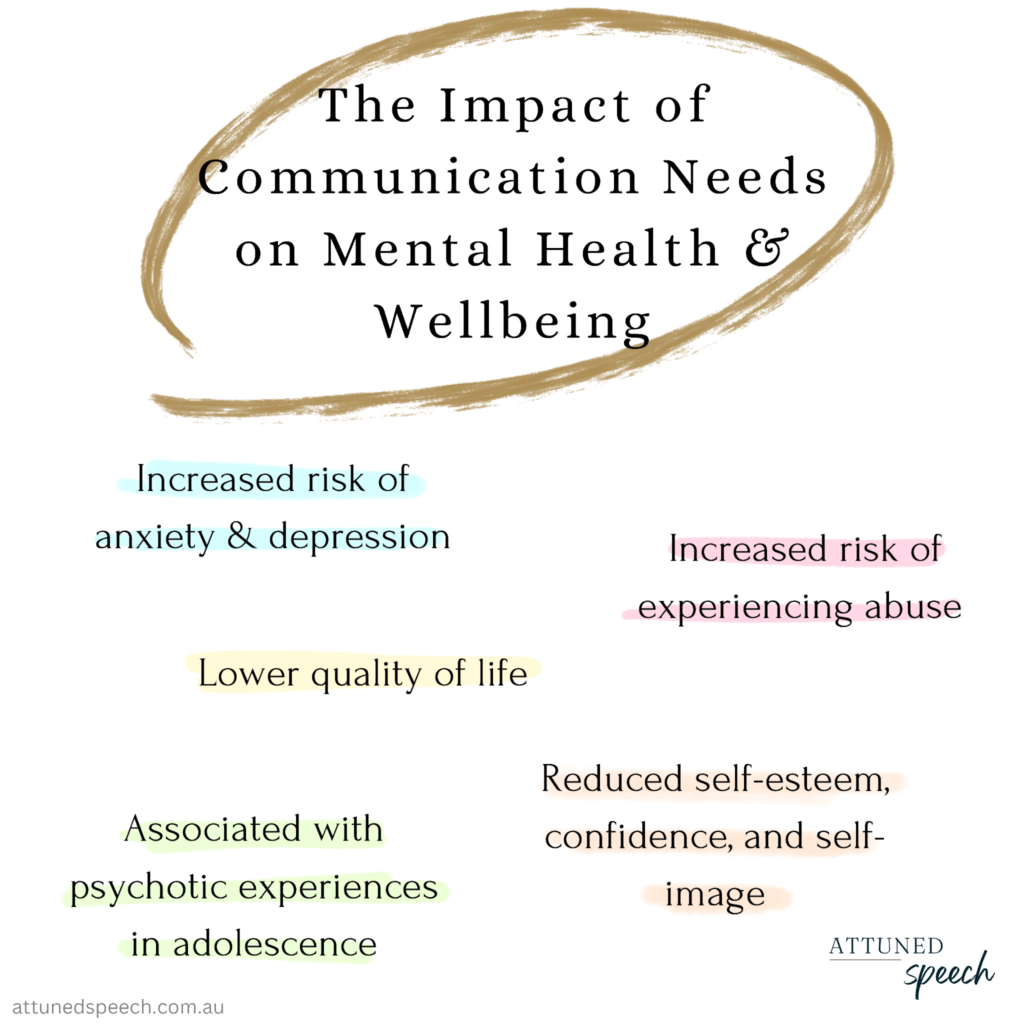Your cart is currently empty!

How Communication Differences Influence Mental Health
Effective communication skills are essential for healthy relationships, and they play a vital role in shaping mental health outcomes. The ability to express emotions, solve problems, manage conflicts, and make choices through speech, language, and communication skills are crucial to living a fulfilling life. However, communication differences can lead to psychosocial consequences that affect all aspects of life, including relationships, academic success, employability, independence, and community participation. Recent research has shown that communication impairments are a significant predictor for higher levels of loneliness and depression in adults2. In this blog post, we will explore the impact of communication differences on mental health outcomes and the importance of addressing them in clinical and community settings.
The Size of the Issue
Speech, language and communication needs or differences can impact social-emotional wellbeing and increase the risk of mental health challenges later in life. According to the Royal College of Speech & Language Therapists (RCSLT), communication differences put children and adults at risk of developing mental health conditions[3]. They state that “people with a primary communication disorder are at a greater risk of experiencing mental health problems than their peers, commonly anxiety and depression”3.
Here’s a summarised list of some of the research:
- A longitudinal study produced by the University of Bristol, found that pragmatic language needs in childhood are associated with psychotic experiences in adolescence4
- In an Australian study published in 2018, they found that preschool children with persistent language needs and unstable language development patterns were more likely to develop social-emotional and behavioural challenges5
- A 2002 literature review found that 57% of children diagnosed with a broad range of language needs also had emotional and behavioural diagnoses6
- Multiple studies have also shown children with language and literacy impairments are more likely to experience increased difficulty in behaviours associated with attention and socialising6,7
- Children with complex support needs are more at risk of experiencing abuse, with nonspeaking communication shown to significantly increase the risk of being deliberately targeted by perpetrators8
- A 2022 systematic review also consistently found social communication needs in children to be closely associated with reduced mental health outcomes9
- Studies also found that communication needs can impact aspects of an adolescent’s personality such as self-esteem, confidence, and self-image10,11
- A 2018 study of children with developmental language disorders found they had a lower quality of life than their peers with co-occuring social-emotional challenges12

Conclusion…?
There is a shockingly limited amount of research directly investigating the impact of speech, language and communication impairments on social-emotional wellbeing and mental health. However based on what I was able to find, it’s evident, at least to me, that communication impairments can most definitely impact social-emotional wellbeing and increase the risk of developing mental illnesses.
So What Might This Mean for Speech Therapy?
I’m of the opinion that we as speech therapists (regardless of specialty) have a larger role to play in supporting the social-emotional and behavioural wellbeing of our clients both young and mature. By that, I mean there may need to be a larger psychological component to our work that is being overlooked. I’m not suggesting that we become psychologists. Instead I believe we all have a responsibility to become more aware, informed, and skilled in identifying and supporting social-emotional wellbeing, developmental trauma, and mental health at all stages of service delivery. This in turn will allow us to increase the responsiveness, safety, and respectfulness of our services. It will also ensure we continue to comply with the ethical principles of beneficence and non-maleficence (in particular the prevention of harm) in our practice as speech therapists13.
Naturally, further research is required to understand the relationship between communication impairments and mental health. There is much to explore regarding how speech therapists integrate social-emotional needs, trauma-informed practices, and mental health into our service delivery. My plan is to use this platform to share what I’ve explored and learnt and to begin discussions regarding mental health strategies in speech therapy work.
Sources
- Better Health – Effects of Stuttering
- The Impact of Communication Impairments on the Social Relationships of Older Adults: Pathways to Psychological Well-Being
- Royal College of Speech & Language Therapists – Mental Health in Adults
- A longitudinal investigation of childhood communication ability and adolescent psychotic experiences in a community sample
- Language and social-emotional and behavioural wellbeing from 4 to 7 years: a community-based study
- Language Skills of Children with EBDA Literature Review
- Conduct problems co-occur with hyperactivity in children with language impairment: A longitudinal study from childhood to adolescence
- Child Abuse, Child Protection and Disabled Children: A review of recent research
- The link between social communication and mental health from childhood to young adulthood: a systematic review
- Self-Esteem in Children With Specific Language Impairment
- Maladaptive personality traits and psychopathology in childhood and adolescence: the moderating effect of parenting
- Quality of life in children with developmental language disorder
- Code of Ethics 2020 – Speech Pathology Australia
